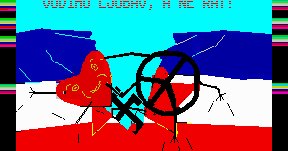So they ordered their coffees in English while the Albanian waiter turns around and ask them in Serbo-Croatian: “Hočeš veliki ili mali?”. Everyone laughed and the Serbian guys felt better immediately. They were surprised by tolerance displayed by the Albanians although they had tried to conceal their true identities. Tolerance is a fundamental and necessary condition for the Serbian and Albanian youth to communicate without fear.
Youth wants change
As a participant of a regional JEF event, I have noticed how young people from Serbia, Kosovo, Macedonia, Albania and other Balkan countries display a desire to see progress not only in their political future but also in the quality of life and the prospect of peaceful living. This is only possible when “good peace” is established in the region. Experts argue that a good peace is a peace that eradicates the hidden reasons for war, a peace that is not a simply a truce, but a change in relations. Serbia cannot possibly offer good peace to Kosovo as long as its society remains unchanged while at the same time Kosovo can not offer good peace to its Serbian population as long as Kosovar society remains unchanged.
This is where the problem lies. Serbia remains a non-democracy “as long as” she makes Kosovar wealth her own (personal savings, proprietary titles etc.) as long as she keeps families in Gjakova in pain over “the lost”. Simply said, Serbia holds its future as well as ours hostage for reasons of no good Balkan stubbornness.
“Fundamental Violence”
Kosovo is also a non-democracy. Kosovo needs to integrate the local Serbs as deeply as possible and cease all violence against them. But Kosovo’s biggest problem is not lack of democracy, but rather poverty.
Poverty, lack of income and wealth or better yet the decrease of it in a given society brings about conflict. Power, money and pride are disappearing goods and when they are scarce in a society like Kosovo, conflict cannot be far behind. In fact some consider poverty and hunger as forms of oppression and violence. They call this “fundamental violence”, which is mostly brought forth by structure of things rather than by direct relations such as murder. In Kosovo there is “fundamental violence” which is not set forth by reasons of the past but rather by extreme poverty. By this definition there is bad peace in Kosovo. There aren’t many murders but there is a lot of poverty and a decline in those scant values, which might cause a new conflict, a glimpse of which we caught in march 2004, during which people suffered violent deaths.
Tolerance is a fundamental and necessary condition for the Serbian and Albanian youth to communicate without fear.
Making democratic ideas a way of life for many young people in Kosovo and Serbia seems to be a bit of a utopian thought. Serbia with her militaristic culture, where the army plays an important role in the direction of the Government, might pose a threat to a country like Kosovo, especially to those people who live on the border with Serbia. Being so close to a potential “time bomb” makes the Albanian youth in Kosovo just as pessimistic as a Serbian youth as far as the prospect of a peaceful and conflict-free life is concerned.
Good peace and independence of Kosovo
To make a daily renewable good peace we need to change not only exterior apparatus of a society and its political system, but also people’s mentality, which happens to be very subjective. A good peace in Kosovo means a quick social change. Independence is necessary from either Serbia or Albania; alternative means to treat conflict and a larger social demand on the government for the peace movement, different political activities, strengthening of views against violence, a pacific education system, all inclusive.
Cultural exchange will prove that national differences do not pose threat to our country. We need to try to establish a citizen’s pride instead of an ethnic pride. A new system which guarantees political equality and human rights, a fast improvement of the economic state, will be the best indicator of Kosovo moving towards a good peace.
The establishing of good peace is naturally tied to the independence of Kosovo, because without independence there will be no good peace in Kosovo, nor will there be bad peace. Independence for Kosovo would also help in the fast integration of Serbia and her democratic movement. I hope that this will not be understood as the usual rhetoric. Serbia truly needs to unload the historical burden and to cease her mysticism of Kosovo. If Kosovo and Serbia start producing such fruitful politics and change the usual discourse from a “win – lose” to a “win – win” situation, they might encourage their youth to trust in a better future. The building of democracies in these countries has a multi-dimensional importance. The most important of all is that two democracies never fight each other. We see two non-democracies fight or democracy fighting non-democracy, but never have we seen two democracies go at war.
This is what a good peace is, when two countries have no reason to fight one another because they have eradicated those reasons. The alternative to good peace is violence, conflict, murder, underdevelopment etc., which is what we have long seen in the Balkans.
If we keep doing these things, students of political sciences in the West will keep being taught how the Balkan region is an unsolvable mess.


Follow the comments: |
|
